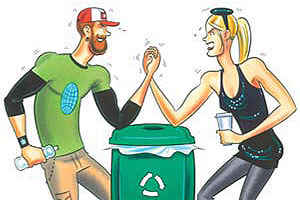
Image by flickr user <a href="http://www.flickr.com/photos/threadedthoughts/3237309854/in/set-72157612982791419/">ThreadedThoughts</a> used under a Creative Commons license
After last week’s organic food online forum, we’re ready for the next course. This week’s topic: recycling and waste. The modern recycling movement got its start alongside the first Earth Day, nearly 40 years ago this week. Since then, recycling’s gone mainstream: Americans now recycle and compost a third of their trash, up from just 6 percent in 1970. Yet, as detailed in the current issue of Mother Jones, we’re generating more waste than ever before. In just 5 minutes, we use another 1,060,000 aluminum cans, 2 million plastic bottles, and 15 million sheets of paper. We’re still drowning in plastic, New York recycles only a fifth of its garbage, and trash haulers still find landfill more profitable than recycling. Then consider that municipal solid waste—that’s the stuff that fills our home garbage cans and office paper bins—is just 2.5 percent of our total “Gross National Trash” output. While we’ve been agonizing over whether our plastic yogurt lids can be recycled, have we been missing the big picture? Is recycling giving us a false sense that we’re solving our waste problem?
We put that question to four experts: Elizabeth Royte, Eric Lombardi, Annie Leonard, and Susan Strasser. Check out some highlights from their answers below the jump. Or head on over to our recycling online forum, which kicks off today. For the rest of this week, our panelists will be checking in to respond to readers, discuss and debate the future of recycling and waste, and perhaps even solve the mystery of the yogurt lid.
 Elizabeth Royte is the author of Bottlemania: How Water Went On Sale and Why We Bought It and Garbage Land: On the Secret Trail of Trash. Her article on zero-waste zealots appears in the current issue of Mother Jones.
Elizabeth Royte is the author of Bottlemania: How Water Went On Sale and Why We Bought It and Garbage Land: On the Secret Trail of Trash. Her article on zero-waste zealots appears in the current issue of Mother Jones.
Yes, I think that people feel they’re doing their part for the environment by putting recyclables into containers at the curb or bringing them to a drop-off center (and they are helping the earth). But that feeling also allows some to continue business as usual—to consume and waste ever more stuff: “I recycle those single-use plastic bottles, so it’s okay to keep buying them.”
 Eric Lombardi is the executive director of Eco-Cycle, one of the nation’s largest nonprofit recyclers. He is a cofounder of the GrassRoots Recycling Network and the Zero Waste International Alliance.
Eric Lombardi is the executive director of Eco-Cycle, one of the nation’s largest nonprofit recyclers. He is a cofounder of the GrassRoots Recycling Network and the Zero Waste International Alliance.
In the bigger picture, recycling is like a gateway drug in that it is the first environmental action of every good Republican. I think the recycling stage is a very large one, and those of us who work on it have unlimited opportunities to create stories, presentations, and visions about all sorts of important environmental issues, including “game-changing ideas” like zero waste, zero carbon, and zero population growth.
 Annie Leonard is an environmental researcher and campaigner. She is also the author and host of The Story of Stuff, an animated online exposé of the hidden costs of consumption.
Annie Leonard is an environmental researcher and campaigner. She is also the author and host of The Story of Stuff, an animated online exposé of the hidden costs of consumption.
There is a reason that recycling comes last in the oft-repeated mantra of “reduce, reuse, recycle.” That is where it should be: a last resort. I say that recycling is the opiate of the masses. It makes us feel good, like we’ve done our part.
 Susan Strasser is a professor of history at the University of Delaware and the author of Waste and Want: A Social History of Trash. She has been praised by The New Yorker for “retrieving what history discards: the taken-for-granted minutiae of everyday life.”
Susan Strasser is a professor of history at the University of Delaware and the author of Waste and Want: A Social History of Trash. She has been praised by The New Yorker for “retrieving what history discards: the taken-for-granted minutiae of everyday life.”
Americans have sorted trash for recycling for centuries. These practices were forgotten during the mid-twentieth century, and in recent years, sorting trash for recycling has become a symbol of care about the environment. [I]t reminds us of the threads that bind our individual households to the planet and the activities of our daily lives to its future.










